Side Effects of Eating Farmed Salmon
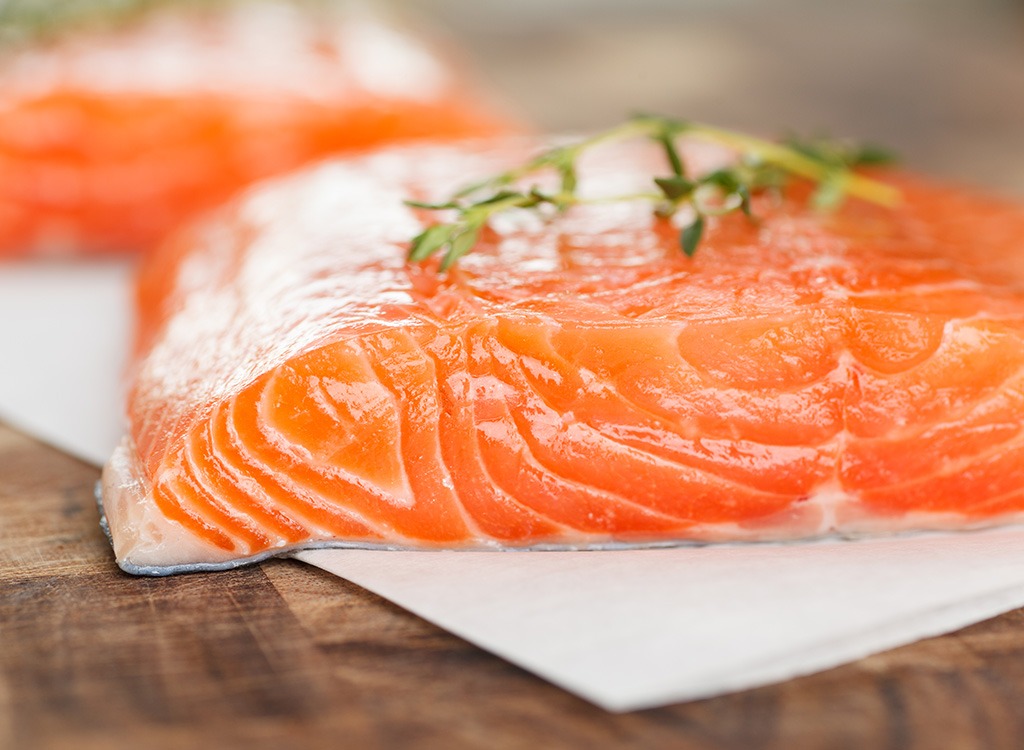
If you’re anything like me, you probably have a lot of negative associations linked to the idea of farmed salmon. That’s likely because previous studies and numerous media outlets have covered the topic of farmed salmon versus wild-caught salmon, making farmed salmon seem like the absolute worst option for your body. We’ve been trained with this idea that farmed salmon is always sad fish from a tank, while wild-caught salmon is happy and free and straight from the ocean. Sure, this can be true in some cases, but it’s not the case for all farmed salmon and wild-caught salmon. This is why we decided to dive into the specific side effects of eating farmed salmon and to truly learn if the negative side effects actually outweigh the positives.
In short: No, they do not. Farmed salmon is still an incredibly healthy source of protein and omega-3 fatty acids for your body to enjoy. Even the Mayo Clinic determined that salmon is the best dinner food you can eat for heart disease.
So why do health experts harp on the negative side effects of eating farmed salmon, and should we be worried about them? Here’s the honest truth you need to know about eating farmed salmon on a regular basis. And if you’re in the market for even more healthy tips, be sure to check out our list of The 7 Healthiest Foods to Eat Right Now.
You’ll get a serious boost in protein.
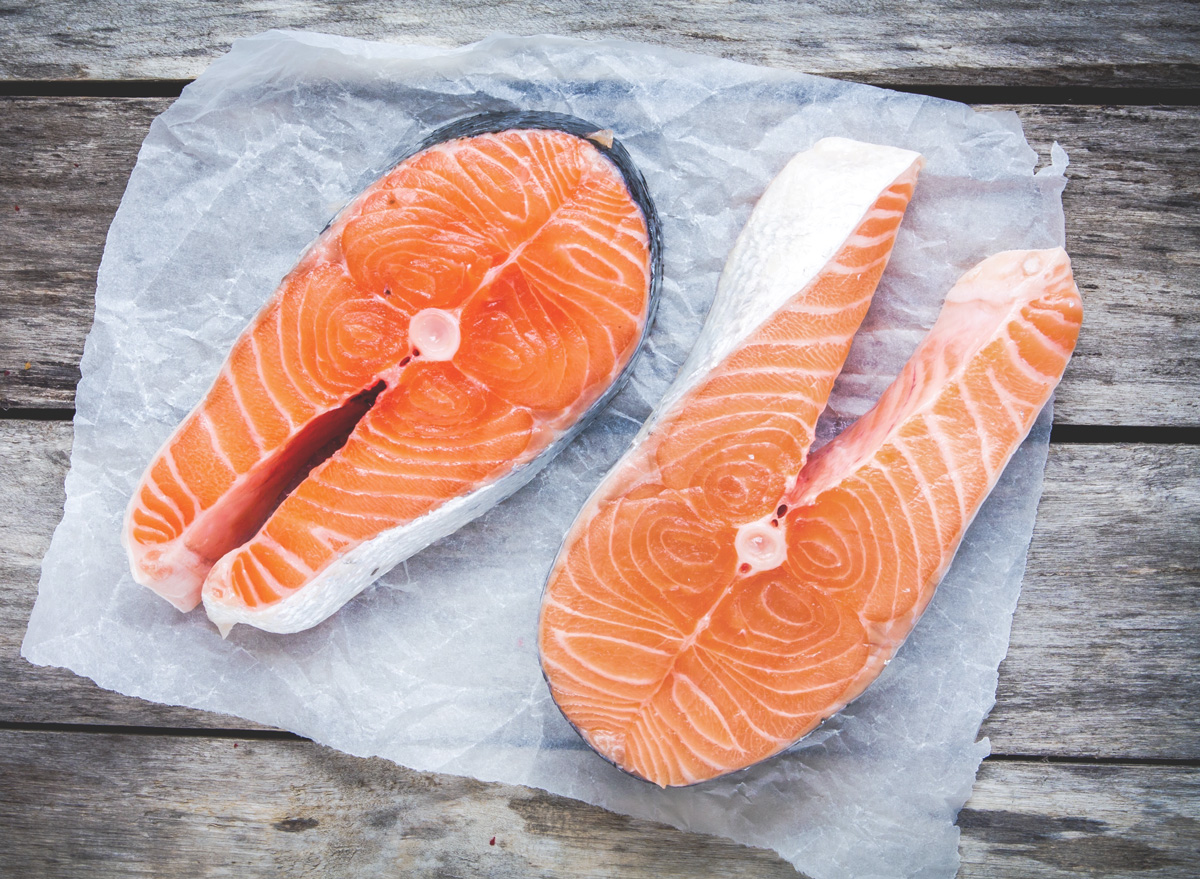
“Salmon is high in protein and omega-3 fatty acids that offer well-known benefits for the heart and brain,” says Shannon Henry, RD for EZCare Clinic. “Salmon is rich in high-quality protein, is an excellent source of B vitamins, and is quite high in potassium.”
Here’s What Happens To Your Body When You Eat Salmon.
It can reduce inflammation and your risk of disease.
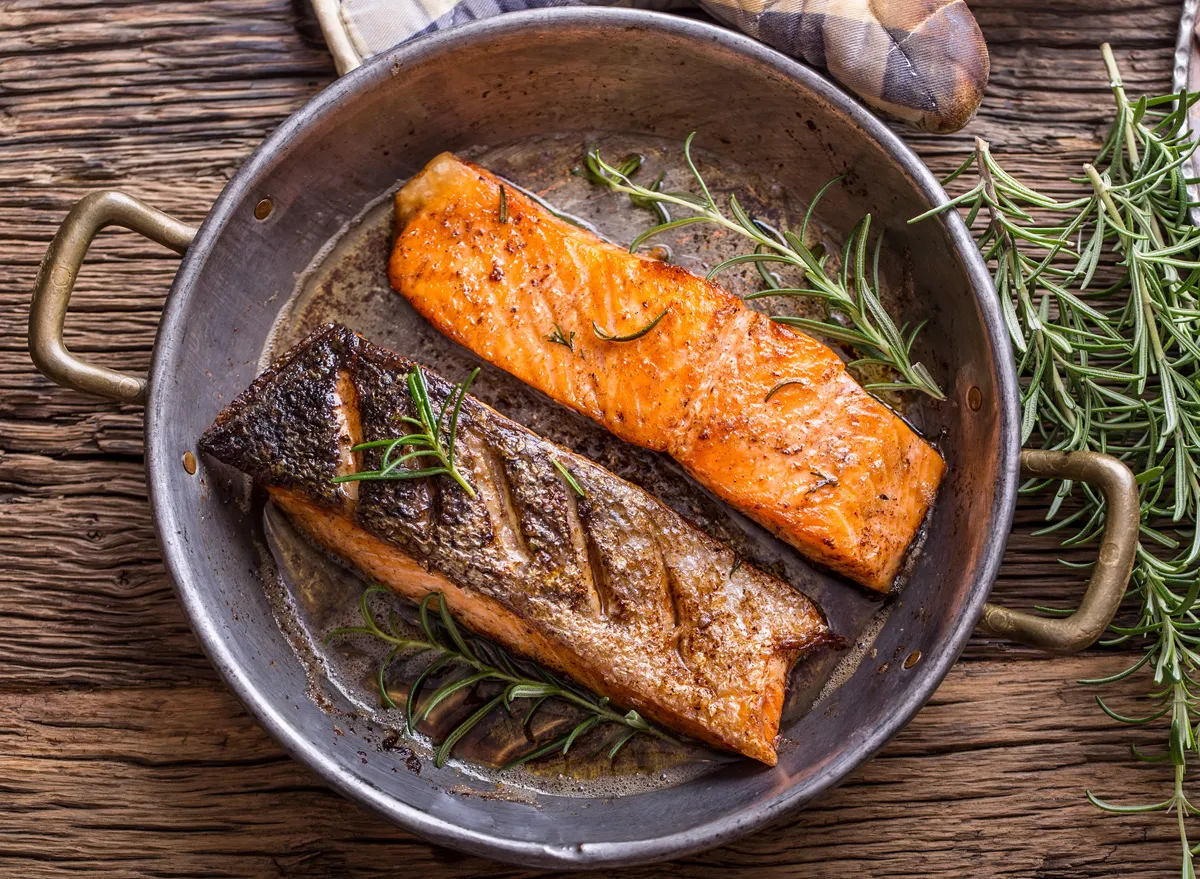
Because of those omega-3 fatty acids, the healthy unsaturated fats can help reduce inflammation in your body—which in return help with reducing the risk of disease, accroding to the American Heart Association (ACA).
“Farmed salmon is an excellent source of protein and omega-3 fatty acids,” says Brenda Braslow, MS and Registered Dietitian with MyNetDiary. “Omega-3 fatty acids provide benefits for heart and brain health. Omega-3s may also reduce the risk of depression, ADHD, dementia, Alzheimer’s disease, diabetes, and arthritis as well as decreased inflammation.”
“The science is clear that eating salmon—whether wild-caught or farm-raised—and other seafood provides big benefits for your heart, brain, and the rest of your body,” says Rima Kleiner, MS, RD at Dish on Fish.
Here are the 26 Best Omega-3 Foods to Fight Inflammation and Support Heart Health.
You may consume some contaminants.
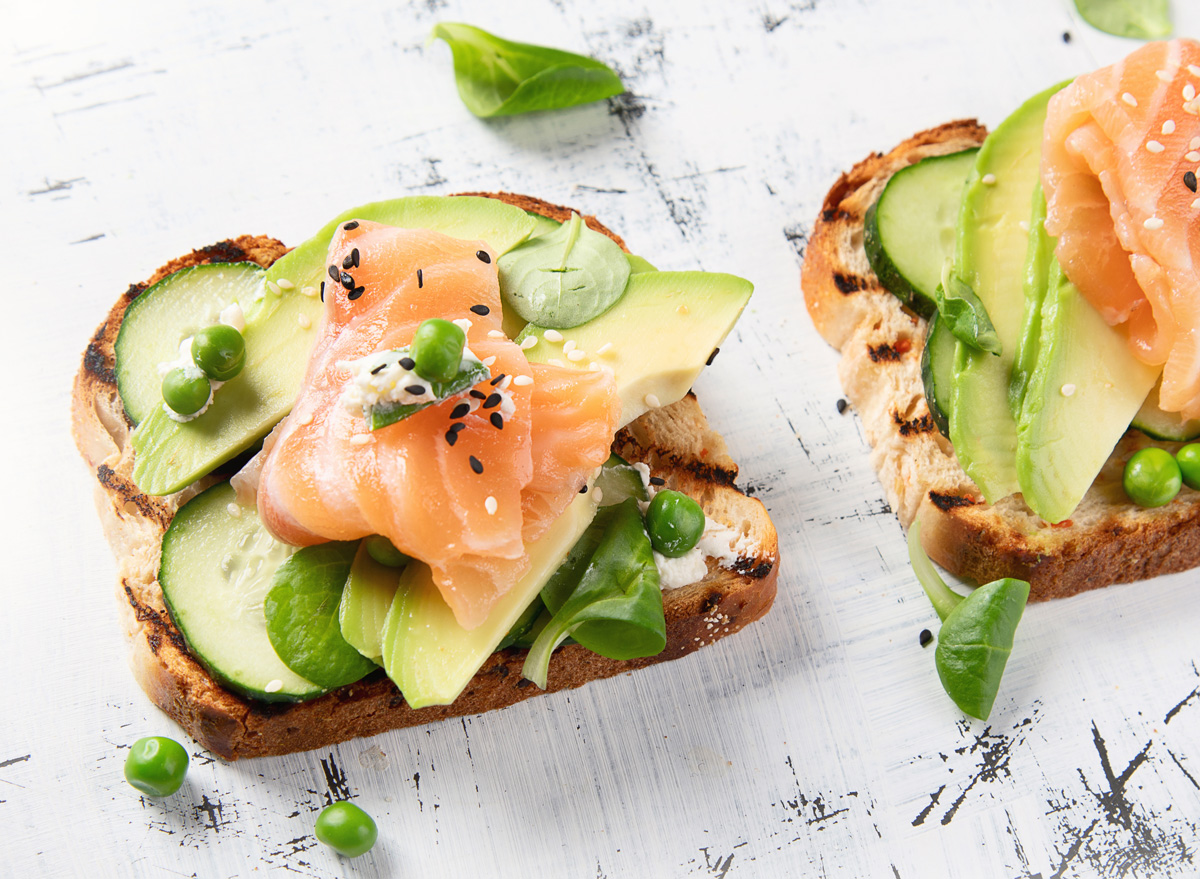
“The debate as to whether or not you should eat farmed salmon is a common one. To help with the dilemma, consider this; Salmon is a heart-healthy food, a rich source of omega-3, proteins, low in saturated fats and calories,” says Edie Reads, RD and chief editor at healthadvise.org. “However, farmed salmon is mostly reared in crowded sea cages and pens. Such controlled conditions are common with toxins, mostly polychlorinated biphenyls (PCBs) whose accumulation in the body is cancerous.”
The PCBs in farmed salmon comes from the feed they consume, which is most likely from smaller fish like herring and anchovies, according to Harvard Health. Contaminated waters that the fish are in can also have an effect.
Nevertheless, while some previous studies have shown accumulation of PCBs has been correlated to an increased risk of cancer, the amount of farmed salmon that would need to be consumed in order for this to make a difference would be an incredibly high amount. One Harvard University study proves that the benefits far outweigh any potential risks. Plus, farmed salmon only accounts for 9% of the PCBs in the average American diet, which is much lower than some dairy products and even vegetables.
“Americans get more PCBs from other healthful foods—like vegetables, chicken, and butter—than from seafood, including farmed salmon,” says Kleiner. “Bottom line? There are no side effects of eating farm-raised salmon. Realistically speaking, the biggest side effect comes from not eating enough seafood.”
If this is something that worries you, the Washington State Department of Health suggests you tossing the skin and the layer of fat on the bottom of the farmed salmon fillet. However, keep in mind that the fat is where you’ll be getting most of those omega-3 fatty acids that make fish so healthy for your body. And if the research (and USDA regulations) both state that eating fat on a farmed salmon is still safe if consumed once or twice a week, there isn’t a need to worry.
Get even more healthy tips straight to your inbox by signing up for our newsletter.
And maybe a few chemicals as well.
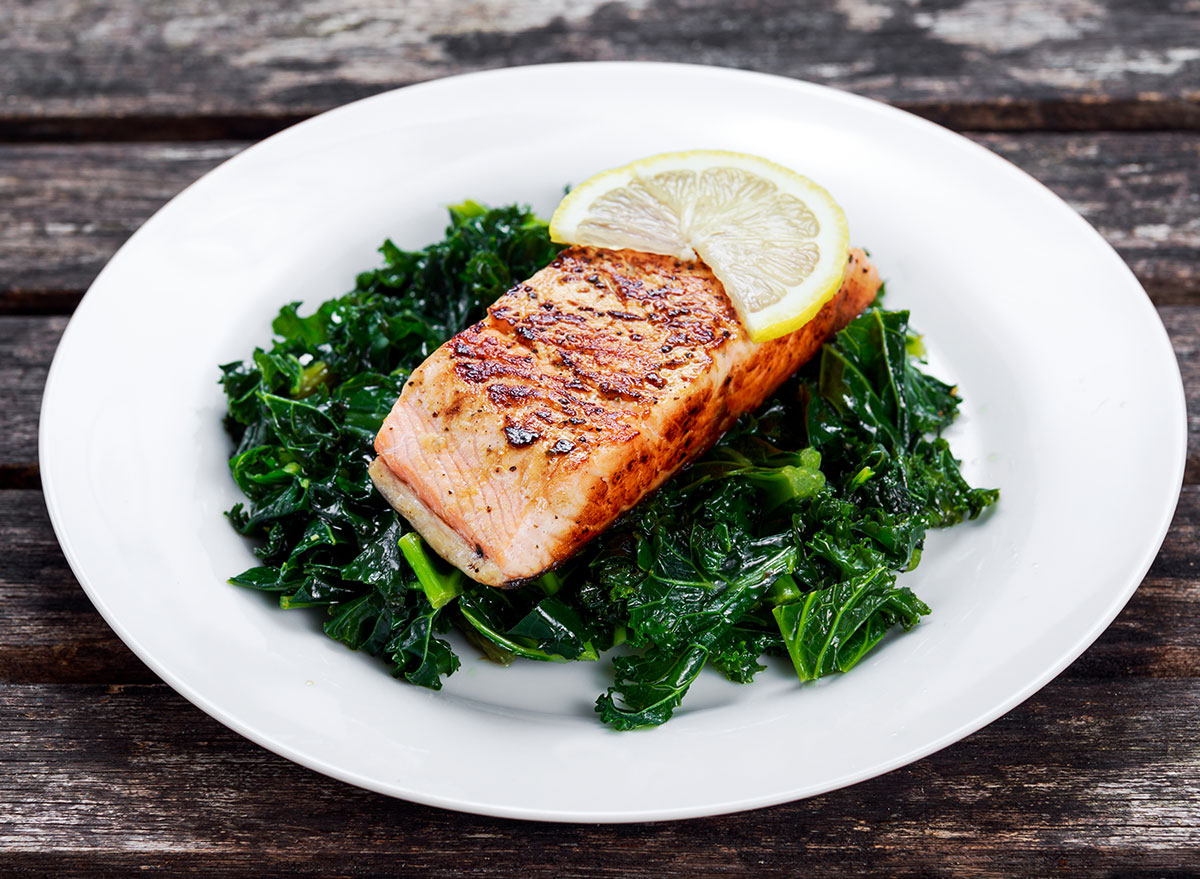
The difference in sustainable and unsustainable farmed salmon practices is the key differentiator here. It all circles back again to the feed of the fish, which causes the salmon to become a particular color compared to others.
“Unsustainable farming practices also tend to cause more accumulation of toxins in farmed fish,” says Reads. “For instance, to attain its pink color, most farmers mix their feeds with other chemicals. Since most salmon present in supermarkets and groceries are farmed, a grey one would look unappealing to customers.”
Wild salmon is known for feeding on all kinds of wild fish like crustaceans, shrimp, and krill. These smaller fish species are full of the antioxidant astaxanthin, which gives the salmon that rich pink color naturally. Here’s Why You Need Antioxidants In Your Diet—And How To Eat More Of Them.
But here’s the key thing to note: Not all farmed salmon is made equal. In fact, there are a few farmed salmon companies that are finding sustainable practices to breed healthy fish without the use of toxic chemicals, like BluGlacier.
Instead of raising their salmon in tanks, BluGlacier creates controlled environments for the salmon to still be ocean-raised. Thanks to a specific net technology they created, their farmed salmon is actually free of contaminants from the ocean, free of contaminants in unhealthy tanks, and also safe from any ocean predators that wild-caught salmon actually have to deal with—like seals.
You may consume more fat.
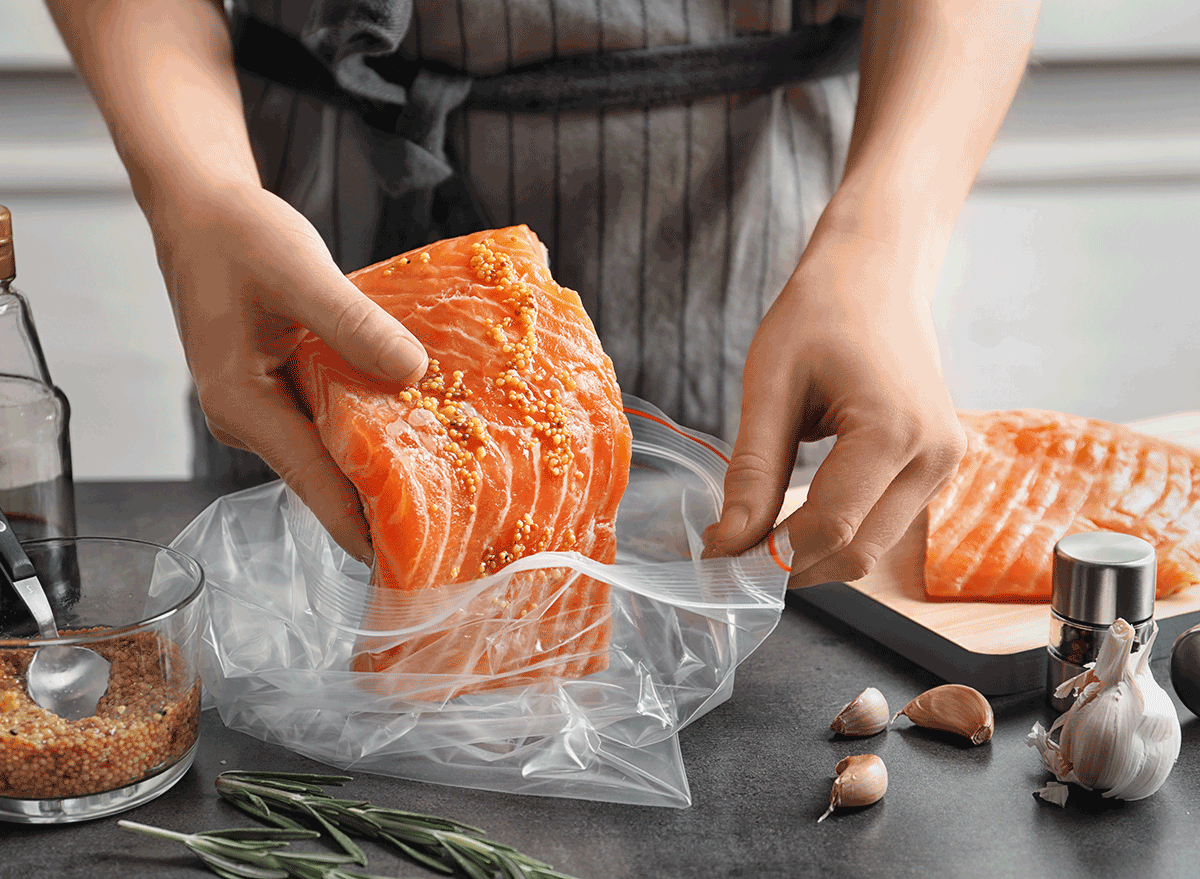
Remember: Fish fat is not a bad thing. The omega-3 fatty acids found in fish are incredibly healthy for your body, so don’t be afraid of a fish with a little fat on it.
Nevertheless, it’s important to note the differences between farmed salmon and wild salmon. Farmed salmon tend to be fattier because they aren’t as active of a fish compared to a wild-caught salmon, which is constantly exercising in the wild, according to the Wild Alaskan Company. If a farmed salmon is fed an unnatural diet and isn’t exercising as much, it may have a build-up of omega-6 fatty acids, which is fat you should consume in moderation.
The best thing you can do when picking out a fish is to look for the stripes of fat on the fillet when you purchase it and to also research the suppliers of that fish and get acquainted with their farming practices. A healthier fillet will have thinner stripes of fat and likely has a richer pink color.
You may still be eating salmon from the ocean.
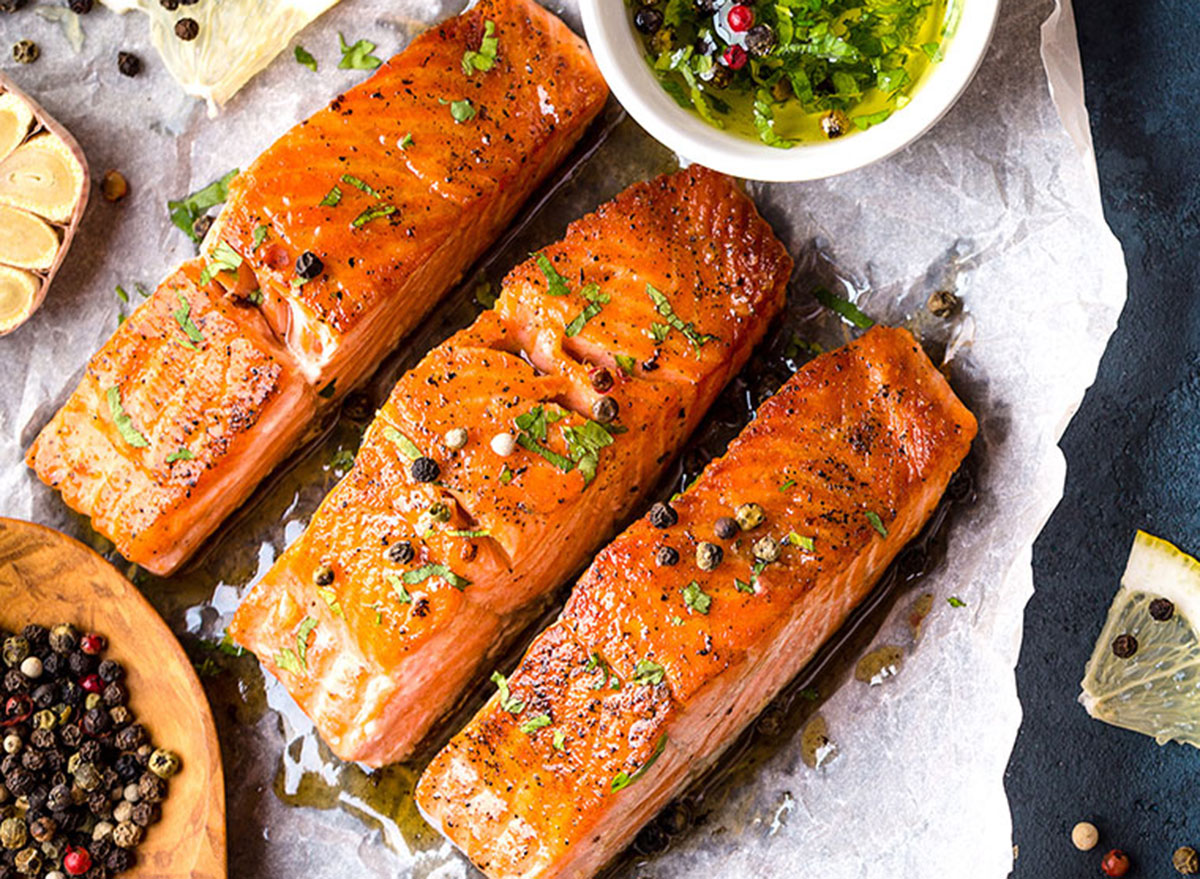
Again, not all farmed salmon is created equal! The term “farmed salmon” is a blanket term for the different practices of farmed salmon, and not all of them are the same.
BluGlacier (who also sells salmon to consumers under the name Oshēn) is still considered a farmed salmon company because of the technicalities around how the fish live in the ocean. In order for a fish to be considered “wild-caught”, it needs to roam free and intermingle with other wild species. However, because companies like BluGlacier can’t determine what will happen to their fish (and what sorts of pollutants they can be consumed while roaming free), they keep their fishes in a large controlled environment right in the ocean. This “farmed” ocean-raised salmon can feel as free as wild-caught in the sea, without all the stress that comes from the wild species, ocean predators, or the contaminants that wild-caught salmon would have to deal with.
So while there are many negative connotations that come with the term “farmed salmon”, don’t judge a book by its cover quite yet. Read up on that particular type of farmed salmon, and be your own critic when it comes to your protein.
You’ll consume fewer microplastics.

“There’s a really big misconception all the time that wild salmon is like roaming free out in the wild, but you know, I can’t speak for all producers, but [some] wild salmon is produced and grows in a tank, then released into the wild to consume whatever natural resources there is within the natural habitat they are in,” says Evelyn Torres, Chief Marketing Officer of BluGlacier.
While there is a myriad of benefits of eating wild salmon in its natural habitat—particularly for that astaxanthin antioxidant we explained earlier—there is still a risk on the contaminants that these fish can consume. Particularly microplastics, which are oceans are currently full of due to the overwhelming plastic pollution in the sea.
Unless the feed for the farmed salmon contains traces of it, there’s a chance you won’t be consuming as many microplastics when eating farmed salmon. Especially from companies like Blue Glacier, which ensures a healthy plastic-free and heavy-metal-free fish by giving their salmon a plant-based feed with an oil made of anchovies and sardines, to make it “tasty” for their fish.
“For our salmon, we are controlling from the beginning of the egg all the way to the final product through our producers,” says Torres. “We actually control the environments that they are in. That’s why we can guarantee that there are no heavy metals or microplastics in the salmon.”
To ensure you’re eating a salmon free of microplastics, heavy metals, or scary toxins and contaminants, the solution is simple: Do your research! There are numerous companies out there that focus on producing healthy salmon—even in the farmed category—that are free of those scary toxins while still producing an affordable, sustainable product that you will love.
To sum it up, you should still eat it.
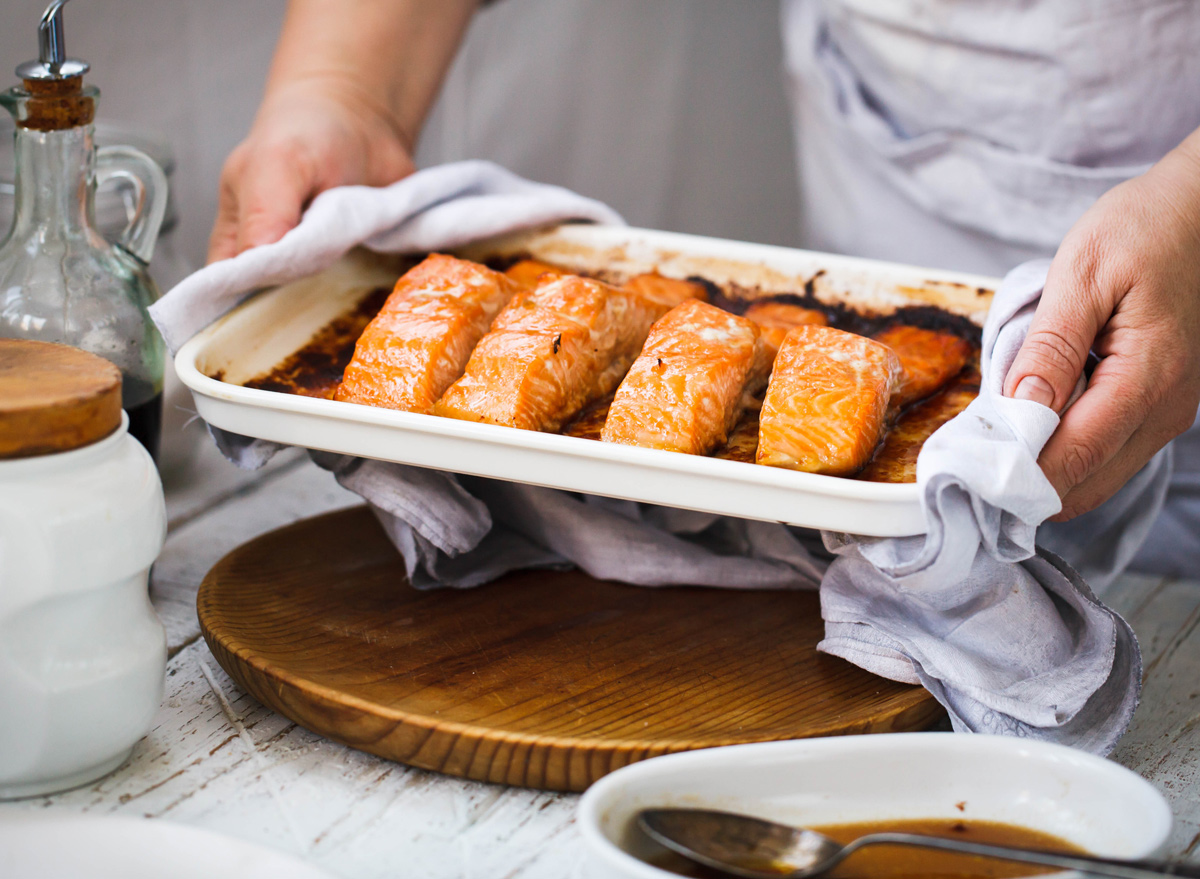
While we find it important to understand the food we put in our bodies, it’s also important to feed our bodies with nutritious foods and to be fearful of them. Many people have determined farmed salmon to be evil and unhealthy, when the truth of the matter is, farmed salmon is still an excellent source of protein for your body. Being educated about your products can help you be a conscious consumer when choosing a salmon to eat.
The USDA Grand Forks Human Nutrition Research says that eating 4 ounces of farmed salmon twice a week is completely safe and can give you all of that nutritional benefit you are looking for (omega 3 fatty acids, reduced heart disease risk, lean protein, etc).
Once you’ve determined the right salmon for you, and all the health benefits have you convinced, why not cook up one of these 21+ Best Healthy Salmon Recipes?